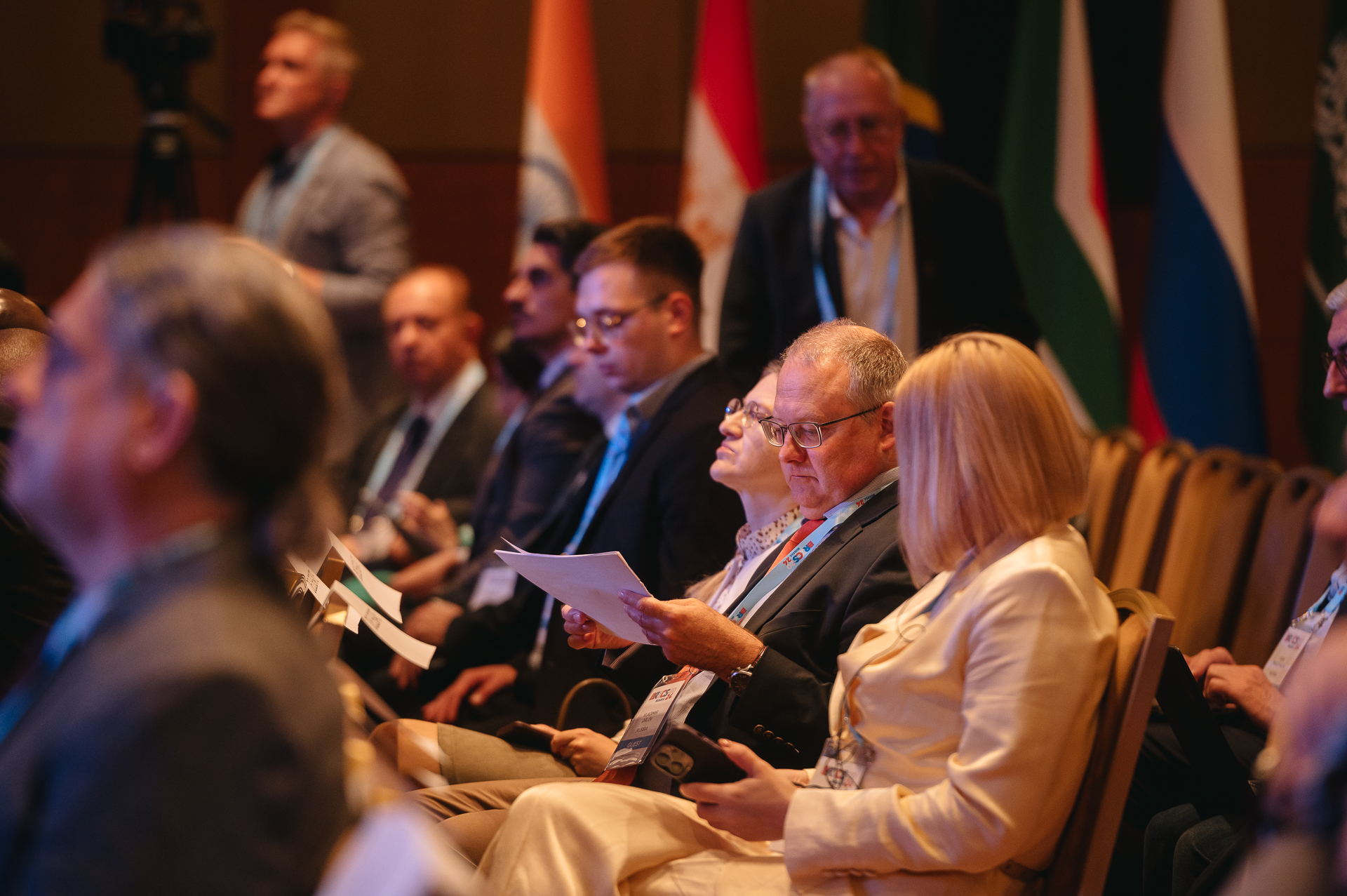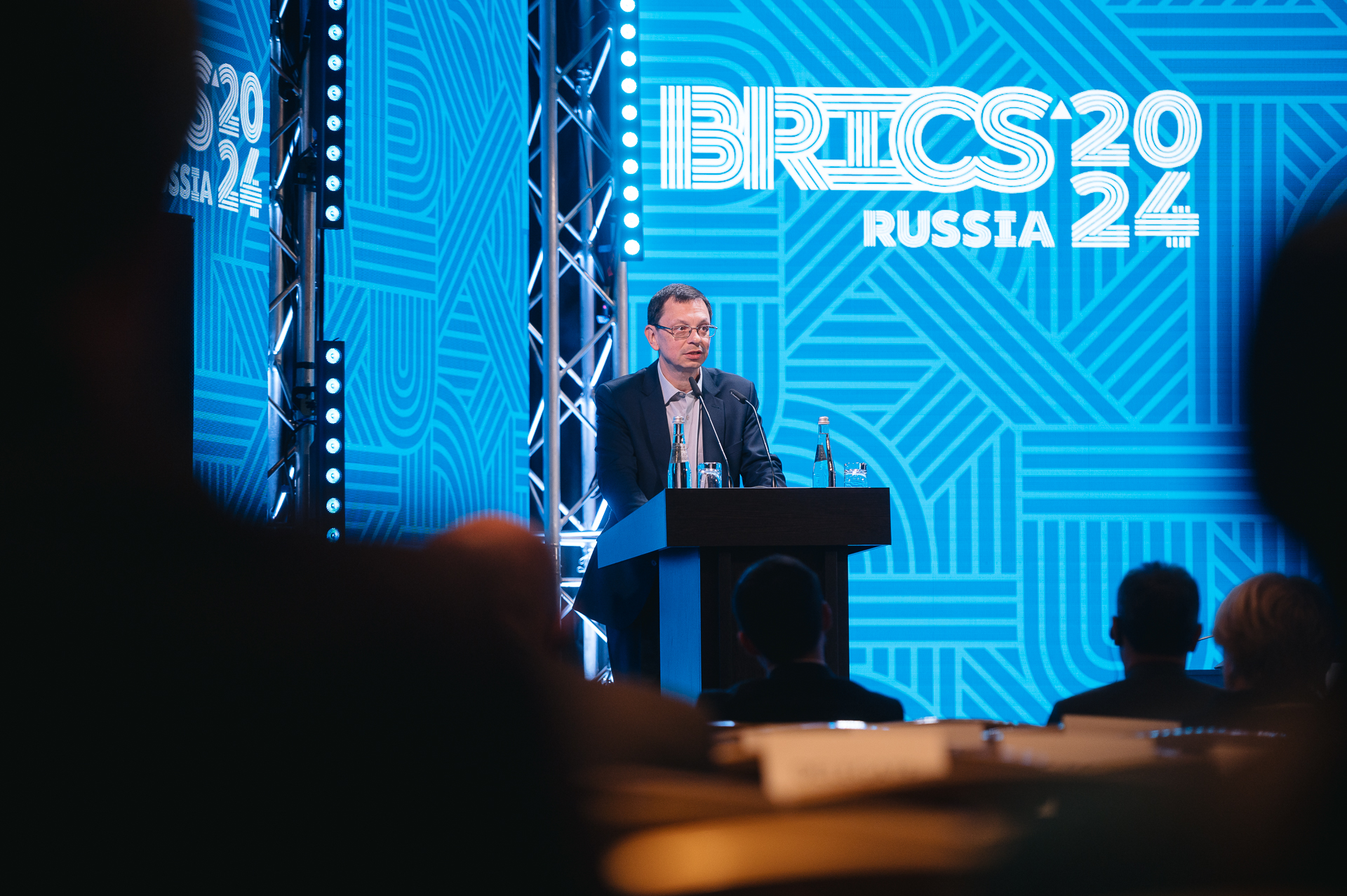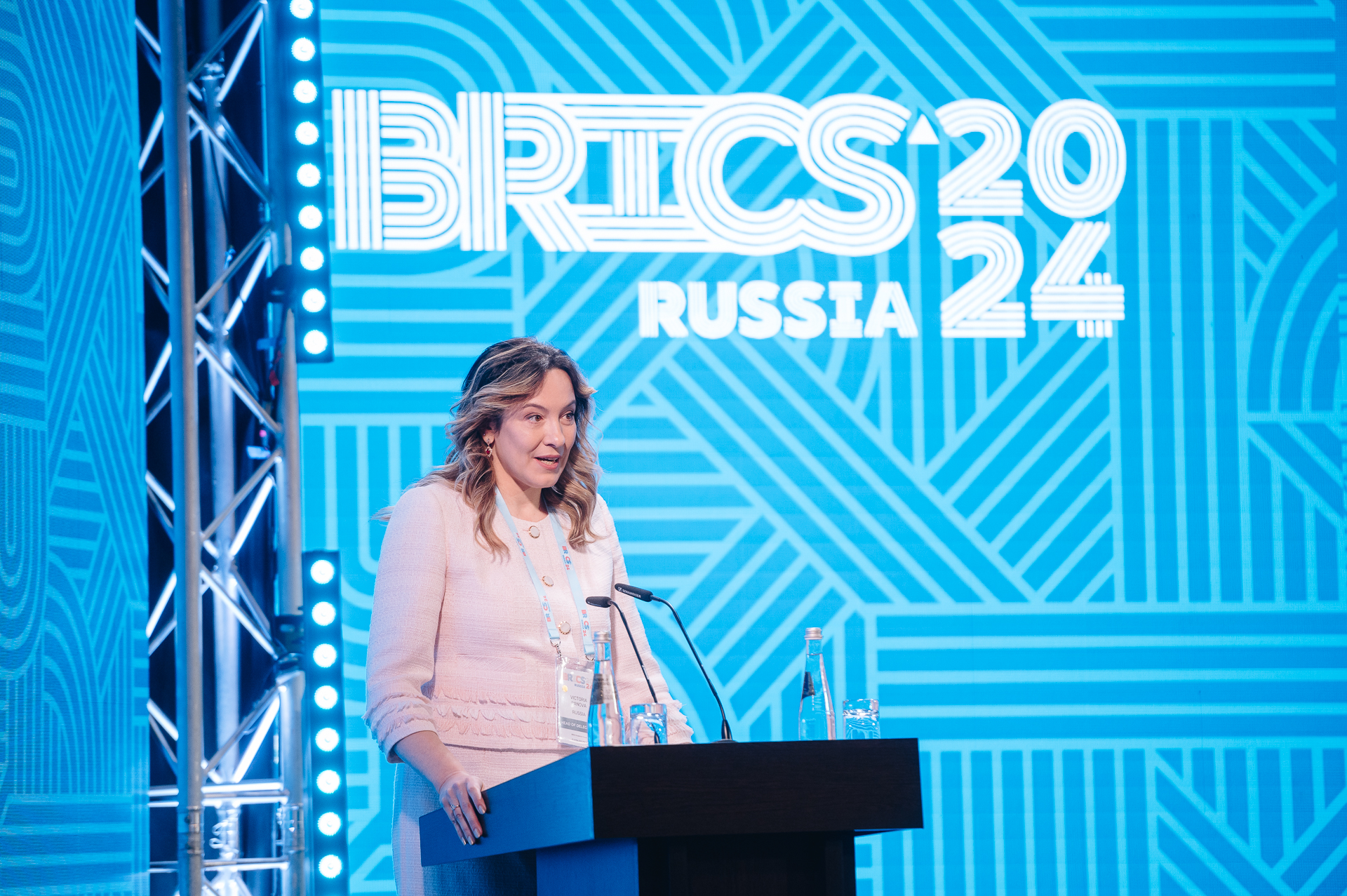BRICS Academic Forum Held in Moscow
The Forum brought together more than 200 representatives from the expert community across all BRICS countries to discuss the topic ‘BRICS: New Figures at the Global Chessboard.’ The forum was organised by the BRICS Expert Council–Russia, which operates on the basis of HSE University. The event’s opening ceremony featured the representatives of the Ministry of Foreign Affairs, the State Duma, as well as HSE University Rector Nikita Anisimov and HSE Vice Rector, Russian W20 Sherpa Victoria Panova.
The Forum's inaugural session began with a moment of silence as the participants honoured the memory of the late Iranian President Ebrahim Raisi, who died in an aviation accident on May 19.
Deputy Prime Minister of the Russian Federation, Alexey Overchuk, sent his greetings to the Forum's participants. He highlighted the critical role that the expert community plays in developing the BRICS agenda and proposing pragmatic approaches to resolving various problems and challenges. A range of initiatives that were suggested by the group’s experts in prior years have already been implemented. Today, BRICS commands significant political authority and colossal economic potential. The countries within the group account for 35.6% of global GDP, which is more than the share of the so-called Group of Seven countries, and are home to 45% of the world's population.

At the conference’s opening ceremony Sergey Ryabkov, Deputy Foreign Minister of the Russian Federation and Russia's BRICS Sherpa, stressed that the Academic Forum has established itself as an authoritative expert platform which enables an informal exchange of views on the most pressing issues of partnership.
The motto of the Russian BRICS chairship in 2024 is ‘strengthening multilateralism for just peace and security.’ Russia aims at constructive cooperation based on the principles of equality and striving for development. According to Ryabkov, another priority of the Russian chairship is the integration of member countries.
BRICS countries focus on developing an innovative partnership strategy and expanding economic cooperation. The group strengthens the role of the member countries in the global monetary system. The countries also continue to fight terrorism and growing challenges in the information space.

Ryabkov added that BRICS countries account for 40% of global oil production and a third of food production, which increases their role in ensuring energy and food security in the world. At the same time, the members actively discuss technological innovations and platforms for cooperation in the field of artificial intelligence, which can impact global economic development. Russia promotes the code of ethics in the field of AI developed by Russian experts. Sergey Ryabkov also highlighted the progress of BRICS in healthcare.

The BRICS agenda was rich in events, but the Academic Forum was important for everyone involved in science and education in our countries, said Nikita Anisimov, HSE University Rector. For HSE University, academic research and expert work is a priority, and work performed within the BRICS framework plays a major role. The Rector noted that it is HSE University that has become the basis for the creation of the BRICS Expert Council–Russia, which coordinates the work of the group's expert and social track. ‘We will do everything to make the BRICS expert work productive,’ assured Nikita Anisimov.
Humanitarian cooperation is one of the BRICS pillars. Science and education are shaping the future, promoting and accelerating progress, and maximum results can be achieved only in terms of international cooperation. The Academic Forum has become a place that brought together the best scientific forces of BRICS countries. The efforts of scientists are aimed at the benefit and development of the entire association.

First Deputy Chair of the Committee on International Affairs of the State Duma of the Russian Federation Federal Assembly and Board Chair of the National Committee on BRICS Research, Vyacheslav Nikonov, stressed that the expansion of BRICS increases the community of the group’s scientists. ‘We come out with proposals that become documents by consensus of the participants. Our role is to develop new ideas, many of them have already been applied and will be implemented when building a new world. BRICS is the construction of the future, it is a union of sovereign nations with common values who want to live in peace with all mankind,’ said Vyacheslav Nikonov.

In her welcoming remarks, HSE University Vice Rector Victoria Panova, who serves as Head of the BRICS Expert Council–Russia, noted that the expert communities in the BRICS member states have been cooperating productively over the course of more than 15 years and began their joint work even before the first BRICS Summit in 2009. The BRICS Expert Council–Russia, established by the decision of the heads of member states, sets a strategic vector for the development of the association and implements specific initiatives.
This year, experts from the countries that have recently joined BRICS took part in the Forum for the first time. ‘New member states will undoubtedly enrich the partnership with fresh ideas. I wish to bring attention to the fact that the doors of expert community remain open for all those who understand the importance of BRICS as one of the institutions of global governance, who understand the need for international expert dialogue, and as well as for those who recognize that the politicization of scientific and academic cooperation is unacceptable. BRICS countries are always open to equal, non-discriminatory partnership,’ said HSE Vice Rector.
Victoria Panova highlighted that the Forum unites the countries interested in strengthening the role of the community, and that are ready for an open, non-discriminatory dialogue in the world.
‘BRICS has many advantages, but human capital is the most important one. Currently, the group accounts for about half of the world's population. The Academic Forum and all other BRICS expert events not only promote the group’s ideas, but also build strong ties between scientific and academic communities, while also creating opportunities for individual cooperation between scientists and researchers from all BRICS countries,’ summed up Victoria Panova.
See also:
HSE University Holds HSE CS × BRICS Ideathon
On November 9, 2025, the HSE CS × BRICS Ideathon—a large-scale intensive event for students aimed at developing international project skills and finding solutions to current challenges facing BRICS countries—took place at HSE University’s Pokrovsky Bulvar campus. The event was organised by the Multilateral Strategic Projects Office with the support of the BRICS Expert Council–Russia , the Faculty of Computer Science (FCS), and the HSE FCS Hackathon Club
‘To Help Make the World More Sustainable, Fair, and Humane’
The BRICS International School: New Generation has concluded at HSE University, bringing together more than 100 participants from 38 BRICS and Global South countries. The attendees included early-career researchers, diplomats, entrepreneurs, journalists, and civil society representatives.
‘Regulators Must Understand That Absolute Predictability is Unattainable’
On October 10–11, 2025, the BRICS Competition Law and Policy Centre at HSE University (the BRICS Centre) hosted a two-day international seminar, ‘Platform Economy: Competition Law and the Market Power of Digital Platforms,’ in Tashkent, Uzbekistan. The event brought together competition authorities from BRICS+ nations and leading antitrust experts from around the world.
Achieving Financial Independence: Experts Discuss Development of BRICS National Currency Settlements
How can BRICS countries move away from the dollar in international settlements, and what can they do to advance this goal today? These questions were discussed by experts during a round table at HSE University. The event was organised by the Multilateral Strategic Projects Office together with the HSE Faculty of World Economy and International Affairs as part of HSE’s activities within the BRICS Network University and the Joint Basic Research Projects ‘International Academic Cooperation of HSE University.’
Experts from HSE University and BRICS Anti-Monopoly Authorities Analyse Global Grain Market
The International BRICS Competition Law and Policy Centre at HSE University presented the scientific report ‘From Fields to Futures: Competition, Financialisation, and Digitalisation in Global Grain Value Chains.’ The document was prepared as part of expert support from the BRICS Working Group on Competition Research in Food Markets. The presentation took place at the academic conference ‘Emerging Challenges of Competition Law and Policy in the BRICS and Beyond’ on September 12, 2025, in Cape Town (South Africa), which the BRICS Centre organised together with the University of Cape Town on the sidelines of the 9th BRICS International Competition Conference.
HSE Launches Training for Future BRICS Experts
From August 20–23, 2025, the Artek International Children’s Centre (Crimea, Russia) hosted an off-site session of HSE University’s educational and outreach project BRICS International School: New Generation. The school was the first event to take place under the cooperation agreement signed this year between HSE University and Artek.
HSE University and University of Campinas Join Forces to Build Alternative Financial System
HSE University and the University of Campinas (UNICAMP, Brazil) have announced the launch of a major joint research project to develop new approaches to an alternative international financial system. The initiative, which brings together leading experts in global economics and finance, seeks to analyse the current state of international financial architecture and explore ways of transforming it in the context of a changing geopolitical landscape.
HSE University to Host BRICS International School: New Generation
Registration for the BRICS International School: New Generation, one of the leading international educational projects aimed at prospective leaders interested in the agenda of global development and cooperation within the framework of BRICS, has opened.
Experts Assess How BRICS Countries’ Education Systems Are Evolving
The BRICS Expert Council–Russia, based at HSE University and operating in collaboration with the HSE Institute of Education, has released an analytical report titled ‘The Transformation of General Education in BRICS Countries.’ The study explores how BRICS nations are addressing shared challenges, including equitable access to schooling, digital integration, support for inclusion, linguistic diversity, and intercultural dialogue.
‘Artificial Intelligence Has Become the Lifeblood of the Global Economy’
Experts from HSE University took part in the BRICS Academic Forum (FABRICS) held in the capital of Brazil this year. The main theme of the event was to discuss cooperation among countries in the Global South amid geopolitical turbulence and rapid technological change. Academics and experts from BRICS member states and partner nations explored topics such as global healthcare, AI technologies, trade, climate change, and reform of the multilateral global security and governance architecture.


